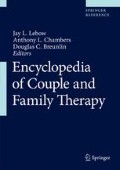Access this chapter
Tax calculation will be finalised at checkout
Purchases are for personal use only
References
Ackerman, N. W. (1966). Treating the troubled family. New York: Basic Books.
Bloch, D. A. (1972). Family interaction: A dialogue between family researchers and family therapists. Family Process, 11, 511–512.
Bloch, D. A. (1981). Family therapy training: The institutional base. Family Process, 20, 131.
Brewster, M. K., & Sheinberg, M. (2015). The Ackerman relational approach: A training manual. Unpublished manuscript.
Colapinto, J. (1995). Dilution of family process in social services: Implications for treatment of neglectful families. Family Process, 34, 59–74.
Edwards, M. (2002). Attachment, mastery, and interdependence: A model of parenting processes. Family Process, 41, 389–404.
Fraenkel, P. (2006). Engaging families as experts: Collaborative family program development. Family Process, 45, 237–257.
Fraenkel, P. (2011). Sync your relationship, save your marriage: Four steps to getting back on track. New York: St Martin’s Press.
Frederick, A. (2014). Depression and suicidality among African American females attending elite private schools: Impact of diminished community support. In C. F. Collins (Ed.), Black and adolescent girls: Facing life challenges, (pp. 211–220), Oxford: Praeger.
Goldner, V. (2004). The treatment of violence and victimization in intimate relationships. Family Process, 37, 263–286.
Goldner, V., Penn, P., Sheinberg, M., & Walker, G. (1990). Love and violence: Gender paradoxes in volatile attachments. Family Process, 29, 343–364.
Hernandez, M., Watts-Jones, D., & Small, S. (1999). Velvet revolution: Changing organizations from the inside. Family Therapy Networker. September–October, 21–22.
Hoffman, L. (1990). Constructing realities: An art of lenses. Family Process, 29, 1–12.
Imber-Black, E. (1992). Rituals for our times: Celebrating, healing, and changing our lives and our relationships (the Master Work Series). New York: Harper Collins.
Imber-Black, E. (1993). Secrets in families and family therapy. New York: W. W. Norton.
Imber-Black, E. (2011). The evolution of family process: Contexts and transformations. Family Process, 50, 173–195.
Kaplan, L., & Small, S. (2005). Multiracial recruitment in the field of family therapy: An innovative training program for people of color. Family Process, 44, 249–265.
Katz, E. (2007). A family therapy perspective on mediation. Family Process, 46, 93–107.
LaPerriere, K. (1982). Family therapy techniques. Family Process, 21, 129–130.
Lewis, C. (2011). Providing therapy to children and families in foster care: A systemic-relational approach. Family Process, 50, 436–452.
Malpas, J. (2011). Between pink and blue: A multidimensional family approach to gender nonconforming children and their families. Family Process, 50, 453–470.
Papp, P. (1983). The process of change. New York: Guilford.
Papp, P. (2000). Couples on the fault line: New directions for therapists. New York: Guilford.
Papp, P., & Imber-Black, E. (1996). Family themes: Transmission and transformation. Family Process, 35, 5–20.
Papp, P., Scheinkman, M., & Malpas, J. (2013). Breaking the mold: Sculpting impasses in couples’ therapy. Family Process, 52, 33–45.
Peck, J. S. (2007). Money and meaning: New ways to have conversations about money with your clients. New York: Wiley.
Penn, P. (1982). Circular questioning. Family Process, 21, 267–280.
Scheinkman, M. (2005). Beyond the Trauma of betrayal: Reconsidering affairs in couples therapy. Family Process, 44, 227–244.
Scheinkman, M. (2008). The multi-level approach: A road map for couples therapy. Family Process, 47, 197–213.
Scheinkman, M., & Werneck, D. (2010). Disarming jealousy in couples relationships: A multidimensional approach. Family Process, 49, 486–502.
Sheinberg, M. (1992). Navigating treatment impasses at the disclosure of incest: Combining ideas from feminism and social constructionism. Family Process, 31, 201–216.
Sheinberg, M., & Brewster, M. K. (2014). Thinking and working relationally: Interviewing and constructing hypotheses to create compassionate understanding. Family Process, 53, 618–639.
Sheinberg, M., & Fraenkel, P. (2001). The relational trauma of incest: A family-based approach to treatment. New York: Guilford Press.
Sheinberg, M., & Penn, P. (1991). Gender dilemmas, gender questions and the gender mantra. Journal of Marital and Family Therapy, 17, 33–44.
Sheinberg, M., & True, F. (2008). Treating family relational trauma: A recursive process using a decision dialog. Family Process, 47, 173–195.
Silverstein, O., & Rashbaum, B. (1995). The courage to raise good men. New York: Penguin.
Steinglass, P. (1987). The alcoholic family. New York: Basic Books.
Stern, M. B. (2008). Child-friendly therapy: Biopsychosocial innovations for children and families. New York: W. W. Norton.
Walker, G. (1991). In the midst of winter: Systemic therapy with families, couples, and individuals with AIDS infection. New York: W. W. Norton.
Walters, M., Carter, B., Papp, P., & Silverstein, O. (1991). The invisible web: Gender patterns in family relationships. New York: The Guilford Press.
Watts-Jones, D. (1997). Toward an African American genogram. Family Process, 316, 375–383.
Watts-Jones, D. (2004). The evidence of things seen and not seen: The legacy of race and racism. Family Process, 43, 503–508.
Watts-Jones, D. (2010). Location of self: Opening the door to dialogue on intersectionality in the therapy process. Family Process, 49, 405–420.
Watts-Jones, D. (2016). Location of self in training and supervision. In K. V. Hardy & T. Bobes (Eds.), Culturally sensitive supervision and training: Diverse perspectives and practical applications (pp. 16–24). New York: Routledge.
Watts-Jones, R. A., Alfaro, J., & Frederick, A. (2007). The role of a mentoring group for family therapy trainees and therapists of color. Family Process, 46, 437–450.
Whiting, R. (2003, 1988). Rituals in families and family therapy. New York: W. W. Norton.
Author information
Authors and Affiliations
Corresponding author
Editor information
Editors and Affiliations
Section Editor information
Rights and permissions
Copyright information
© 2019 Springer Nature Switzerland AG
About this entry
Cite this entry
Braverman, L. (2019). Ackerman Institute for the Family. In: Lebow, J.L., Chambers, A.L., Breunlin, D.C. (eds) Encyclopedia of Couple and Family Therapy. Springer, Cham. https://doi.org/10.1007/978-3-319-49425-8_595
Download citation
DOI: https://doi.org/10.1007/978-3-319-49425-8_595
Published:
Publisher Name: Springer, Cham
Print ISBN: 978-3-319-49423-4
Online ISBN: 978-3-319-49425-8
eBook Packages: Behavioral Science and PsychologyReference Module Humanities and Social SciencesReference Module Business, Economics and Social Sciences

